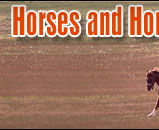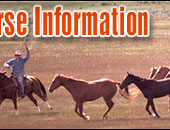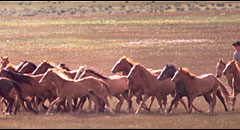 |
   |
|
|
| You are here: Horses > Horse Adoption and Rescue > Texas > Bluebonnet Equine Humane Society |
Bluebonnet Equine Humane Society, Located in Fort Bend County, Texas
Contact Phone: 888 542 5163
Hours of Operation:
Address:
Bluebonnet Equine Humane Society
P.O. Box 632
College Station, TX 77481
Located in: Fort Bend County
Website: www.bluebonnetequine.org
Group Background:
Our organization was founded in 2005. However most of
our BOD members have several years more of rescue experience. I'm
the Executive Director, and I have been involved with horse rescue
since 1999. We've taken in approximately 350 horses and have found
adoptive homes for about 250 to date.
Personally, I have been involved with horses since about 1985. I've
shown horses in various disciplines, worked with trainers, and
trained my own horses. I have a MS and PhD in Animal Science,
specializing in equine behavior, learning and welfare.
How are Horses Acquired:
We work with law enforcement officers throughout
Arkansas and Texas to investigate reports of neglect and abuse,
educate the owners when possible, and seize/remove the horses when
necessary. We prepare for court and present testimony in court.
To date, we've received 60 neglect reports this year. The number of
horses we take in monthly varies depending on the neglect cases at
the time. Our capacity varies as we work through foster homes.
We do take neglect reports from the community and investigate.
How the Horses Rehabilitated:
Horses are at a healthy weight, receive VEWT,
Flu/rhino, rabies and WNV vaccines, have dental work performed and
are put on a current de-worming and farrier care program before they
go up for adoption.
If they are untouchable/scared of people/not gentle, they're gentled
before going up for adoption. Horses should be able to be caught
and lead before going up for adoption.
We also evaluate the horses to the best of our ability to see what
they know. We have a training fund which allows us to have
professional trainers evaluate some of the horses and also allows us
to get training for some of the horses.
Foster homes are the ones who do the rehabilitation, and those with
the training/knowledge also help with gentling and training. Foster
homes who do not have rehab. experience are paired with mentors who
teach them how to rehab. foster horses.
Group Specialties:
We're a very professionally run group, and we treat our
members, volunteers and adopters well. We work with adopters to
make good matches - providing follow-up help when needed.
We put on the Bluebonnet Horse Expo annually as a fundraiser,
"friend raiser" and educational event. The event includes clinics
and demos throughout the day, and several BEHS horses come to meet the public.
Rewards:
MS and PhD in Animal Science, specializing in Equine
Behavior, learning and welfare
Certified Humane Investigator
Featured on multiple local news shows, RFD-TV, national and regional magazines
We're a registered 501c3 non-profit, and we've received grants from
the ASPCA and PETsMART.
Typical Day at the Facility:
There are no typical days. Foster homes provide daily
hands-on care to their foster horses, and the volunteers are
involved in doing neglect investigations, pre-foster/adoptive home
visits, and follow-up visits on fostered and adopted horses.
We work on neglect cases: receiving complaints, assigning
volunteers, working with law enforcement, etc.
We collaborate with other rescues to handle large-scale neglect cases.
Horses Available:
We have between 50-75 horses available for adoption most
times, and adoptions vary by month. During the spring and early
summer, we may see 15-20 adoptions in a month. Right now, adoptions
are a bit down thanks to the economy.
Adoption Procedures:
Adopters:
- Submit an adoption application
- Receive a pre-adoption home visit
- Once approved to adopt, visit the horse(s) they're interested
in. If they're riding horses, adopters must ride them to see if
they're compatible.
- If compatible, adopters sign an adoption contract and pay an adoption fee.
- Adopters receive follow-up visits at about 2, six, 12 and 24
months post adoption.
Testimonials:
We have adopted horses competing in endurance,
dressage, pony club events, and more. We have mules who have been
trained to drive for trail rides and horses who go on trail
rides. Many of our adopters help spread the word about the rescue
and refer other potential adopters to us.
Donations & Local Volunteers:
Yes, we accept monetary donations, donations of horse
items, and volunteer support.
Comments:
|
| |
|
|
|
|
 |
|
|
|
|
|
Horse Education
|
|
|
|
|
Horse Information Topics
|
|
|
|
|
|
|
|
Horse Business Owners
|
| |
Advertise with Us
Have your horse products or services exposed to over 27,000 of our monthly visitors.
|
|
|
|
|
|